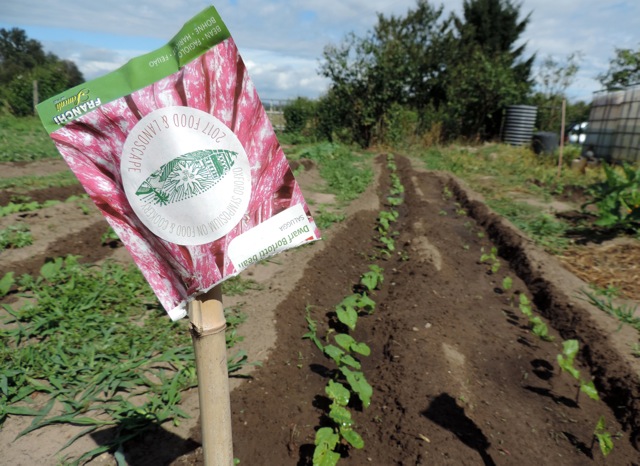
Borlotti Beans in Burgundy
Image credit: Di Murrell
Symposiast Di Murrell plants ‘Seeds’ in anticipation of next year’s Symposium
We wondered at the significance of the borlotti beans and how they might have fitted into the food-fest which is the Oxford Symposium of Food and Cookery. Why should there be packets and packets of the things there for the taking? Could they have been a small gift from Borough Market and meant to be placed beside our plates when we sat down to our Ploughman’s Lunch but forgotten in the haste of serving? Maybe we were supposed to take them away to pot up and plant; to have an actual living memory of our week-end at St.Catz? Perhaps they were meant to be a link between this year’s subject – ‘Landscape’ and next year’s – ‘Seeds’? Is a bean a seed or is it a fruit or could it be both, I wondered? No idea – but as we left the dining hall we helped ourselves to several packets of them anyway.
Two days later we were back at our small hovel in Burgundy. It was late and dark as we walked into the garden but we knew immediately something was wrong. Our feet scuffed through leaves of Virginia creeper torn from the walls of our old house which now lay in shredded heaps on the crazy paving path. How odd! Perhaps our friend Markus had been round and decided to give the stuff a haircut – it grows so fast at this time of year – but surely he would have cleared it away? Too tired to think it through we tottered off to bed and woke late the following morning to perfect Burgundy weather: sun in a cloudless sky with a cool breeze to temper the heat. Just as it had been when we had departed for Oxford only a few days previously. Except – something had changed.
Our ancient peach tree had been, when we left, weighed down with fruit. It now stood like a forlorn waif in the centre of our small garden, its leaves in tatters and its fruit gone. On the ground beneath lay heaps of half-grown peaches, pockmarked and bruised. Every soft leaved plant in the garden looked as though it had been attacked by locusts. All the flowers had disappeared.
We went to find Markus. His large allotment was decimated. Gone were his courgettes, his cucumbers, his salads, his onions, his fennel; every leaf and stalk torn, shredded and dying. The roots – potatoes, beets, radishes and carrots – would soon die too without the energy their leaves provide. Fruit lay everywhere upon the ground; tomatoes bashed to pieces; the broccoli, cavolo nero, and runner beans planted especially for his English friends (the French don’t grow these), all destroyed. This same brutal scene was replicated in every garden throughout our village and a line could be plotted across the landscape marking the trail of devastation. Caused by a storm of hailstones the size of golfballs, our neighbours had endured an onslaught from the heavens that had lasted a full twenty minutes. The ice lay up to eighteen inches deep on the ground, then had melted so rapidly that a torrent of water streamed down the narrow lanes and into people’s houses. The noise on ancient tiled roofs was horrendous. The storm came from nowhere and when it passed it was as though it had never been except for the devastation wrought.
Too late now to replant most things for this year. And yet, and yet, the weather of this region is (normally) so benign and the land is the rich alluvial soil of the Saône Valley; it can grow almost anything and quickly too.
We remember our cache of Borough Market borlotti beans and give them all to Markus to plant. It is barely a week later when we go to inspect and there they are – microscopic shoots – tiny seedlings – pushing up through the warm earth. In view of their preciousness they have been particularly well protected from the depredations of the field mice who view them as delicacies of the first order. We go each day to look and marvel.
So there you have it, whatever it might be: a metaphor perhaps for hope and the future; a reflection upon the working of small miracles; or maybe it is just the most satisfying way of using a gift of borlotti beans courtesy of Borough Market and the Oxford Symposium of Food and Cookery.
Di Murrell can be found at www.foodieafloat.com
